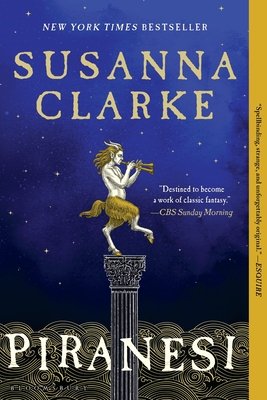A book review: Piranesi
Title of the book: Piranesi
Author: Susanna Clarke
Publisher: Bloomsbury Publishing
Publication Date: 15th of September 2020
Genre: Fantasy, Mystery, Mythology
Why I picked up this book:
Piranesi is actually a book I picked up at the height of my historical fiction /alternative history/alternative mythology binge. Which, in no small part, was brought on by amazing books like Circe, A Thousand Ships and Lancelot.
It was a genre that I previously swerved. Call me ignorant but I operated under the preconceived notion that this was a ‘lazy’ way of writing. I know, I know. I’ve eaten crow, don’t worry about it. Boy was I proven wrong by some of the most amazing authors out there.
I bought Piranesi, fully thinking it would carry on in the spirits of the aforementioned books. Wrong again. It did deliver though, in the most strange way.
About the author:
Susanna Clarke was born in Nottingham in 1959. A nomadic childhood was spent in towns in Northern England and Scotland. In 1990, she left London and went to Turin to teach English to stressed-out executives of the Fiat motor company.
She returned to England in 1992 and spent the rest of that year in County Durham, in a house that looked out over the North Sea. There she began working on her first novel, Jonathan Strange & Mr Norrell.
From 1993 to 2003, Susanna Clarke was an editor at Simon and Schuster's Cambridge office, where she worked on their cookery list. She lives in Cambridge with her partner, the novelist and reviewer Colin Greenland.
Synopsis:
‘Piranesi's house is no ordinary building: its rooms are infinite, its corridors endless, its walls are lined with thousands upon thousands of statues, each one different from all the others. Within the labyrinth of halls an ocean is imprisoned; waves thunder up staircases, rooms are flooded in an instant. But Piranesi is not afraid; he understands the tides as he understands the pattern of the labyrinth itself. He lives to explore the house.
There is one other person in the house—a man called The Other, who visits Piranesi twice a week and asks for help with research into A Great and Secret Knowledge. But as Piranesi explores, evidence emerges of another person, and a terrible truth begins to unravel, revealing a world beyond the one Piranesi has always known. ‘
My thoughts:
What Clarke achieved with Piranesi is quite unique, I’ll be the first to come out and say as much.
99% of the time, when a book starts the way Piranesi does, it loses me. It loses me fast. This book was heading down that, much-trodden path for the first 60 pages. Perhaps it’s down to the fact that I am terrible with directions. So telling me something is taking place in the 89th north-eastern vestibule means exactly nothing to me. Maybe it’s down to the fact that I have issues with timelines if we are working with ‘the year the Albatros came to visit’. It’s distracting and requires some significant mental gymnastics on my part to immerse myself in the story and envision the environment. So much so that I couldn’t even begin to imagine Piranesi up until that point. Which wasn’t helped by the lyrical language used to describe our setting. Don’t get me wrong, it was beautiful to read, like a book of poetry. It just made it harder to connect with our main character.
However, and this is a big fat however. What the author managed to pull together from page 60 onwards is truly genius. As we follow Piranesi, who is undergoing significant mental change, both positively and negatively, the language changes, the way we view the world through his eyes changes. The book itself becomes a glorious metaphor for the metamorphosis of our main character. Even the entire genre changes! Alternative history gets swept away with the tides and is exchanged for a masterful mystery that was hidden right under our noses this whole time. Statues the silent audience who have seen and judged it all.
I found it incredibly hard to put this book down once it got going. It reads like a Chinese puzzle box and the Legal nerd that lives rent-free inside my brain could not get enough of it. Extrapolating minute details to build the bigger picture, construct what has happened before to lead us to the now. I live for it. Which I appreciate is a very personal thing, and automatically means that this book is not for everyone. As I said, for the first 60 pages it wasn’t even for me, though the rest of it more than makes up for it.
Piranesi is magical, mysterious and melancholy. It is certainly not the ‘easy read’ the 240 pages might suggest, but it is worth the effort.
What are your thoughts? Have you joined me on team sceptic-turned-convert? Was this one of those books that hit you in all the right places? Or was Piranesi simply not your cup of tea? Let me know in the comment section below, and until then - just one more page!



